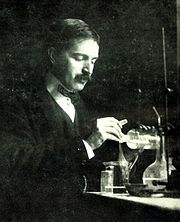Theodore William Richards
| Theodore William Richards | |
|---|---|
 |
|
| Born |
January 31, 1868 Germantown, Pennsylvania |
| Died | April 2, 1928 (aged 60) Cambridge, Massachusetts |
| Nationality | United States |
| Fields | Physical chemistry |
| Institutions | Harvard University |
| Alma mater |
Haverford College Harvard University |
| Doctoral advisor | Josiah Parsons Cooke |
| Doctoral students |
Gilbert N. Lewis Farrington Daniels Malcolm Dole Charles Phelps Smyth |
| Known for |
Atomic weights Thermochemistry Electrochemistry |
| Notable awards | Davy Medal (1910) Willard Gibbs Award (1912) Nobel Prize for Chemistry (1914) Franklin Medal (1916) |
Theodore William Richards (January 31, 1868 – April 2, 1928) was the first American scientist to receive the Nobel Prize in Chemistry, earning the award "in recognition of his exact determinations of the atomic weights of a large number of the chemical elements."
Theodore Richards was born in Germantown, Philadelphia, Pennsylvania to William Trost Richards, a land- and seascape painter, and Anna née Matlack, a poet. Richards received most of his pre-college education from his mother. During one summer's stay at Newport, Rhode Island, Richards met Professor Josiah Parsons Cooke of Harvard, who showed the young boy Saturn's rings through a small telescope. Years later Cooke and Richards would work together in Cooke's laboratory.
Beginning in 1878, the Richards family spent two years in Europe, largely in England, where Theodore Richards' scientific interests grew stronger. After the family's return to the United States, he entered Haverford College, Pennsylvania in 1883 at the age of 14, earning a Bachelor of Science degree in 1885. He then enrolled at Harvard University and received a Bachelor of Arts degree in 1886, as further preparation for graduate studies.
Richards continued on at Harvard, taking as his dissertation topic the determination of the atomic weight of oxygen relative to hydrogen. His doctoral advisor was Josiah Parsons Cooke. Following a year of post-doctoral work in Germany, where he studied under Victor Meyer and others, Richards returned to Harvard as an assistant in chemistry, then instructor, assistant professor, and finally full professor in 1901. In 1903 he became chairman of the Department of Chemistry at Harvard, and in 1912 he was appointed Erving Professor of Chemistry and Director of the new Wolcott Gibbs Memorial Laboratory.
...
Wikipedia
